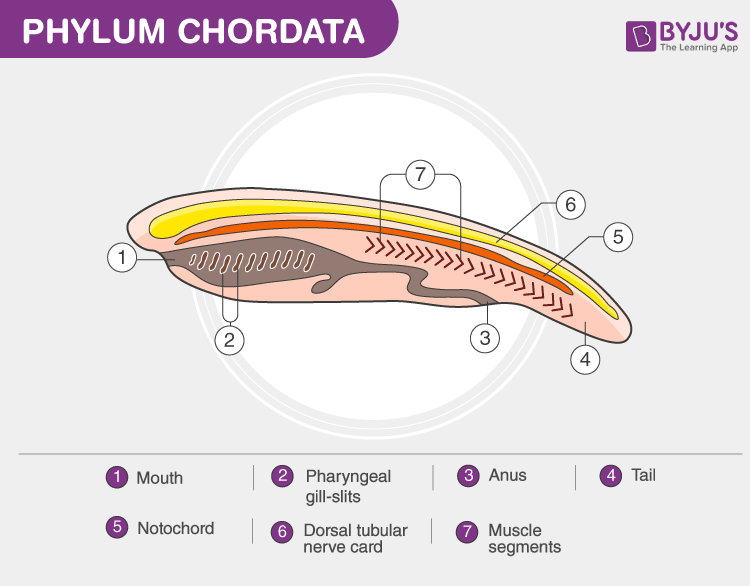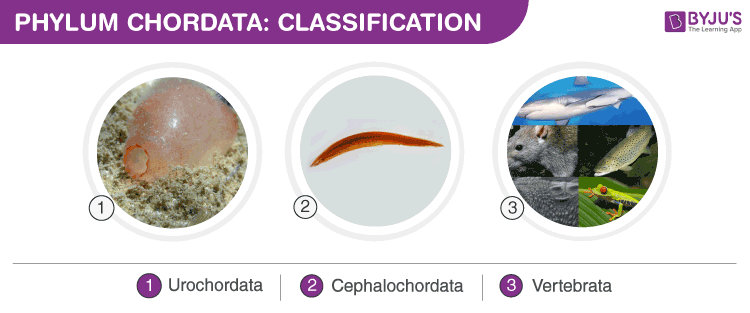Can You Identify The Animal Phylum To Which Each Example Or Characteristic Belongs?

Phylum Chordata belongs to the Kingdom Animalia and includes all the vertebrates, i.eastward., animals with a backbone, and several invertebrates, i.e., organisms without a courage. They possess a bilaterally symmetrical body and are divided into three different sub-phyla.
Explore more: Kingdom Animalia

Allow us accept a detailed look at the characteristics and classification of the phylum Chordata.
Characteristics Of Phylum Chordata
Phylum Chordata possesses the following feature features:
Notochord
It is a longitudinal, cartilaginous rod running between the nerve cord and the digestive tract. Information technology acts every bit a support for the nerve cord and is replaced by the vertebral column after the embryonic stage in all vertebrates.
Dorsal Nerve Cord
Information technology is a parcel of nerves running along the "dorsum" and splits into the brain and the spinal cord. It is hollow and lies dorsal to the notochord.
Pharyngeal Slits
They are the openings which allow the entry of water through the mouth without entering the digestive system viz. they connect rima oris and throat. All Chordates take these openings on the lateral sides of the throat at some stage of their life.
Mail service anal Tail
It is an extension of the body to the anus. In chordates, the tail is composed of skeletal muscles which aid in locomotion in fish-like species. It is absent-minded in well-nigh of the adult Chordates.
Other characteristics of chordates include:
- Bilaterally symmetrical, triploblastic, coelomic and segmented body.
- The body design is complex and well-differentiated.
- The body has an organ system level of organization.
Also Read:Animal Kingdom
Nomenclature Of Phylum Chordata
Phylum Chordata is classified into 3 subphyla, namely
- Urochordata (tunicates),
- Cephalochordata (lancelets)
- Vertebrata (vertebrates).

Nomenclature Of Phylum Chordata into three Sub-Phyla
The subphylum Urochordata and Cephalochordata are collectively known as protochordates, which are marine animals. They are invertebrates only they share attributes of chordates.
Urochordata
- The adults are fixed to the substratum.
- Information technology is also known every bit Tunicate considering the body of an adult is enclosed within a tunic fabricated upwardly of cellulose-similar substance known as tunicin.
- Notochord can be seen only in the larval stage and disappears in adults.
- The nerve string present in larva is replaced past a dorsal ganglion in adults.
- The larva can motion and undergoes a metamorphosis.
For due east.g., Ascidia, Salpa, Doliolum.
Cephalochordata
- The atrium is present.
- Motile adult and larval phase.
- The tail is present throughout life.
- They show progressive metamorphosis.
- The notochord is plant throughout life.
- Numerous well-developed pharyngeal gill slits are present.
For eastward.g., Lancelets possess the notochord and nervus cord throughout their life. However, they lack the encephalon and bony vertebral column like Branchiostoma.
Vertebrata
The feature features of vertebrates include:
- These are advanced chordates and have attic effectually the brain.
- The notochord is replaced by a vertebral cavalcade in adults. This is why information technology is said that 'all vertebrates are chordates simply all chordates are not vertebrates'.
- A high caste of cephalization is observed.
- The epidermis is multi-layered.
- They consist of 3 types of muscles-striped, unstriped and cardiac.
- They have a well-developed coelom.
- The gastrointestinal tract is complete.
- The heart is three or iv-chambered.
- They take well-developed respiratory and excretory systems.
- Endocrine glands are present in all.
- They are unisexual and reproduce sexually, hagfish being an exception.
For eastward.chiliad., humans.
Subphylum Vertebrata is further classified into seven classes. They are:
- Cyclostomata
- Chondrichthyes
- Osteichthyes
- Amphibia
- Reptilia
- Aves
- Mammalia
Examples of Phylum Chordata
Examples of phylum Chordata include the following:
Lampreys
This chordate belongs to the sub-phylum Vertebrata. It is a fish devoid of jaws and spends its larval stages as a filter-feeder. Information technology gets transformed into a parasite equally information technology grows into an developed.
Sea Eject
It is a Urochordate with a barrel-shaped body attached to the substratum. The larva is tadpole-like and possesses a notochord. They conduct a dorsal nervus, pharyngeal slits and a post-anal tail.
Likewise Read:Arthropoda
Learn more than in detail well-nigh the phylum Chordata, its characteristics, nomenclature and other related topics at BYJU'S Biology.
Source: https://byjus.com/biology/phylum-chordata-classification/
Posted by: powellwereft.blogspot.com

0 Response to "Can You Identify The Animal Phylum To Which Each Example Or Characteristic Belongs?"
Post a Comment